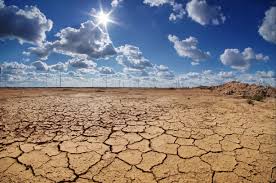The prevalence of climate-related disasters is unrelenting and has already affected 180 million people across Africa and resulting in loss and damages of over $22 billion and counting, African officials said.
Speaking at a special session in the preparation for African inputs to the climate Action Summit to be convened in Paris on 23 September 2019, Rural Economy and Agriculture Director at AU Commission, Godfrey Bahiigigwa said the threat of climate change to the progress of economic prosperity in Africa looms larger.
Godfrey Bahiigigwa said even though Africa has the least carbon emission, it is the most affected continent due to its low adaptation capacity for climate change impacts.
53 African countries have so far committed to Nationally Determined Contributions (NDCs) identifying the need for an estimated $3.5-4 trillion of investments in Africa by 2030.
The continent contributes fewer than 6 percent of emissions, with per capita emissions of only 0.8 tons per year, well below the global mean of 5 tons, and far lower than other regions such as Europe and Asia, it was learned.
African countries are now committed to Climate action in support of building resilience through early warning system, comprehensive risk assessment and management and risk insurance, James Kiryangi, a representative from African Development Bank has said. Africa’s first urgent action is to build the resilience and adaptation to the adverse impacts of climate change for the most vulnerable communities across the continent.
The NDC that include both mitigation and adaptations actions require close to 3 trillion USD of conditional and unconditional financing to implement, UNECA said in a statement. Our first urgent action is to build the Resilience and Adaptation to the adverse impacts of climate change for the most vulnerable communities across Africa. Having signed and ratified the Paris Agreement, nearly all African countries are now committed to Climate Action in support of building resilience through early warning systems, comprehensive risk assessment and management and risk insurance, Kiryangi said
Early this year, Tropical Cyclones Idai and Kenneth ripped through five African countries of Mozambique, Malawi, Tanzania, Zimbabwe and the Comoros, all within a period of one month. They both set records in their paths of destruction: Kenneth as the strongest storm ever to fall on Africa, and Idai as the worst ever storm in terms of loss and damages to hit the African continent. More than 1,000 lives were lost, 1 billion US dollars in damages.
It will take at least $2 billion, perhaps more, to mount an effective recovery and the needed rehabilitation efforts.
In 2018, the African Development Bank allocated $1.6 billion dollars to climate adaptation actions and leveraged additional resources across the five operational areas that guide the Bank’s focus on strengthening the adaptive capacities of its regional member countries.
Through the Climate and Development in Africa Programme (ClimDev), the Bank is investing $17 million to modernize Africa’s climate and weather observation networks, providing access to satellite data and delivering services to offer timely and reliable weather and climate forecasts.
At the heart of ClimDev’s efforts is the $21.5 million in Regional Centers across Africa, which is positioned to lead the Continent’s efforts in the face of impending extreme weather risks.
The three-day conference is being held at AU headquarters in Addis Ababa under the theme “Stepping Up Climate Action for a Resilient Africa: a Race We Can and Must Win”.
MG/abj/APA


